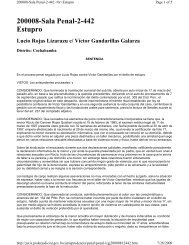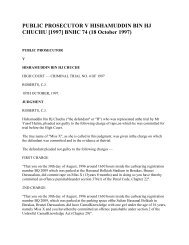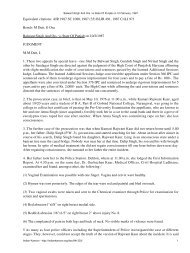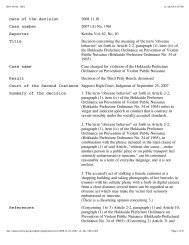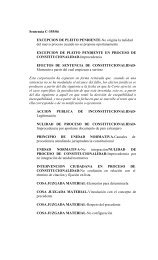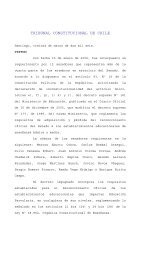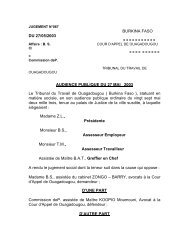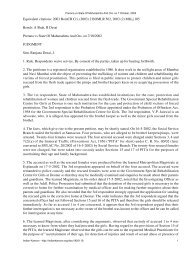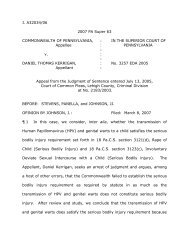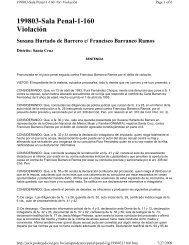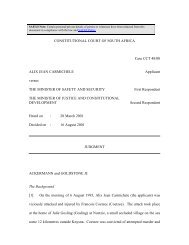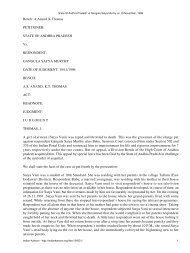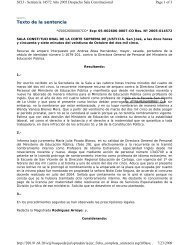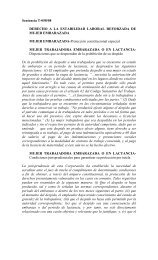P. Rathinam v. Union of India - Cornell University
P. Rathinam v. Union of India - Cornell University
P. Rathinam v. Union of India - Cornell University
- No tags were found...
You also want an ePaper? Increase the reach of your titles
YUMPU automatically turns print PDFs into web optimized ePapers that Google loves.
an Organisation called "Suicide Prevent". May it be reminded that a law which is cruel violates Article 21 <strong>of</strong>the Constitution, a la, Deena v. <strong>Union</strong> <strong>of</strong> <strong>India</strong>29. (4) Why is a particular act treated as crime? What acts areso treated?49. Earliest reference to the word "crime" dates back to 14th century when it conveyed to the mind somethingreprehensible, wicked or base. Any conduct which a sufficiently powerful section <strong>of</strong> any given communityfeels 29 (1983) 4 SCC 645 : 1983 SCC (Cri) 879: AIR 1983 SC 1155 414to be destructive <strong>of</strong> its own interest, as endangering its safety, stability or comfort is usually regarded asheinous and it is sought to be repressed with severity and the sovereign power is utilised to prevent themischief or to punish anyone who is guilty <strong>of</strong> it. Very <strong>of</strong>ten crimes are creations <strong>of</strong> government policies andthe Government in power forbids a man to bring about results which are against its policies.50. In a way there is no distinction between crime and tort, inasmuch as a tort harms an individual whereas acrime is supposed to harm a society. But then, a society is made <strong>of</strong> individuals, harm to an individual isultimately harm to society.51. A crime presents these characteristics: (1) it is a harm, brought about by human conduct which thesovereign power in the State desires to prevent;(2) among the measures <strong>of</strong> prevention selected is the threat <strong>of</strong> punishment; and (3) legal proceedings <strong>of</strong> aspecial kind are employed to decide whether the person accused did in fact cause the harm, and is, accordingto law, to be held legally punishable for doing so. (See pp. 1 to 5 <strong>of</strong> Kenny's Outlines <strong>of</strong> Criminal Law, 19thEdn., for the above propositions.)52. Protection <strong>of</strong> society is the basic reason <strong>of</strong> treating some acts as crime. Indeed it is one <strong>of</strong> the aims <strong>of</strong>punishment. Where there is no feeling <strong>of</strong> security, there is no true freedom. What is the effect <strong>of</strong> the samecannot be described better than what was stated by Hobbes in Leviathan, which is:"There is no place for industry, because the fruit there<strong>of</strong> is uncertain; and consequently no culture <strong>of</strong> the earth;no navigation nor use <strong>of</strong> the commodities that may be imported by sea; no commodious building; noinstrument <strong>of</strong> moving and removing such things as require much forces; no knowledge <strong>of</strong> the face <strong>of</strong> the earth;no account <strong>of</strong> time; no arts, no letters; no society; and which is worst <strong>of</strong> all continual fear and danger <strong>of</strong>violent death; and the life <strong>of</strong> a solitary, poor, nasty, brutish and short."53. As constitutionality <strong>of</strong> Section 309 has been assailed as being violative <strong>of</strong> Article 21 which protects lifeand personal liberty, it would be in fitness <strong>of</strong> things to note what J.S. Mill had to say about making an actrelatable to personal liberty punishable. This is what Mill had said in this connection in his famous tract OnLiberty : "The object <strong>of</strong> this Essay is to assert one very simple principle, as entitled to govern absolutely thedealings <strong>of</strong> society with the individual in the way <strong>of</strong> compulsion and control, whether the means used bephysical force in the form <strong>of</strong> legal penalties or the moral coercion <strong>of</strong> public opinion. That principle is that thesole end for which mankind are warranted individually or collectively, in interfering with the liberty <strong>of</strong> action<strong>of</strong> any <strong>of</strong> their number, is self- protection. That the only purpose for which power can be rightfully exercisedover any member <strong>of</strong> a civilised community, against his will, is to prevent harm to others. His own good, eitherphysical or moral, is not a sufficient warrant. He cannot rightfully be compelled to do or forbear because itwill be better for him to do so, because it will make him happier, because, in the opinions <strong>of</strong>415P.<strong>Rathinam</strong> vs <strong>Union</strong> Of <strong>India</strong> on 26 April, 1994others to do so would be wise, or even right. These are good reasons for remonstrating with him or reasoningwith him, or persuading him, or entreating him, but not for compelling him, or visiting him with any evil incase he does otherwise. To justify that, the conduct from which it is desired to deter him must be calculated to<strong>India</strong>n Kanoon - http://indiankanoon.org/doc/542988/ 12



